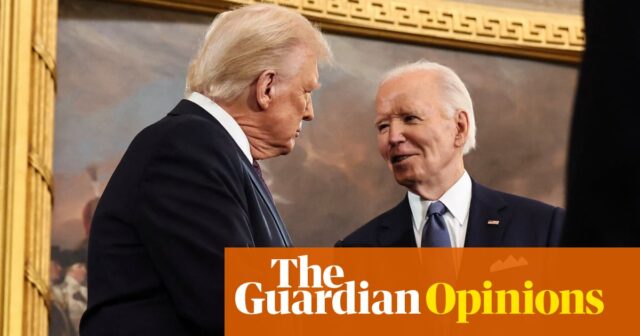The dust briefly settled, only for it to be kicked up once again. Donald Trump’s flurry of executive orders – causing chaos on everything from foreign aid to world trade – is rapidly rocking and reshaping domestic and foreign policy. And the temptation is, yet again, to think of Donald Trump as an exogenous shock to US democracy. But look closer, and you will see not a rogue president taking a hammer to a hitherto stable political order, but a history of the erosion of norms that paved the way for him.
Political norms are the scaffolding of democracy, enforced not by the law, but by a sort of social consensus. They are not codified, strict mechanisms for regulating political facts – such as the separation of powers – but the agreement that such things should be respected and observed. A clear case in point is the president’s ability to issue pardons. And Joe Biden’s pardoning of his family members was as much an injury to norms as Trump’s pardoning of those convicted after 6 January.
“We talk about America’s system of government,” New York Times columnist Ezra Klein said after Trump’s inauguration, “as if it is a solid thing, bound by the constitution and institutions the way a belt cinches around the waist. But it’s really just a pile of norms in a trenchcoat. Knock the norms down and everything changes.” Trump’s very purpose is to knock them down, but in some ways, he is only accelerating a process that had already started.
Take Trump’s order to construct a migrant detention centre in Guantánamo Bay – a space that has for years operated outside international law despite outcries and appeals for closure. Hundreds of prisoners were kept there under military law, often following rendition, disappearance and torture at CIA black sites. Trump’s proposal to detain tens of thousands of migrants there is an outrageous move, but it is not an aberration. He is building, literally, on what came before him.
“Like many of Trump’s authoritarian attacks on human rights, this one has shameful precedents in US history,” Vince Warren, executive director of the Center for Constitutional Rights, told CNN. “Long before the second Bush administration used the facility to hold and abuse nearly 800 Muslim men and boys as part of its ‘war on terror’, the first Bush administration held Haitian refugees there to try to deny them their rights under international law.” The prison, in fact, currently houses detained migrants in a facility called the Migrant Operations Center. Last year, the Biden administration awarded a private contractor over $160m (£130m) to run the facility.
Another of Trump’s directives also builds on precedent. One of his executive orders pledges to deport students and others without US citizenship who participate in pro-Palestine protests. But their actions were already condemned and over-policed way before Trump was re-elected. Don’t forget that the Democrats blocked requests for a Palestinian speaker at their convention, and across the country “liberal” academic institutions expelled students for protesting, withheld their degrees, and called in armed police to dismantle their sit-ins.
The same goes for Trump’s withdrawal from international organisations such as the World Health Organization and his imperial adventurism when it comes to foreign policy. The US has a long record, under much more gentlemanly presidents, of breaking international law, insulting international institutions and embarking on unilateral campaigns licensed by its superpower status. Over two decades ago, Congress passed a law authorising “all means necessary and appropriate” to “free US or allied personnel detained by or on behalf of the International Criminal Court”. It was dubbed the Hague Invasion Act. The “war on terror” was itself one long, disastrous, norm-busting campaign. A week before the US and its allies invaded Iraq, the United Nations secretary general warned them that military action would be a violation of the UN charter.
Even optically, Trump’s alliances with tech billionaires is crude and visible, but it mirrors the billionaires and influencers who flocked to Kamala Harris’s campaign, more of whom publicly backed her than Trump. Biden continued the practice of previous presidents, Republican and Democrat, of tapping up super-rich donors for ambassadorial positions before Trump made the quid pro quo explicit with his cabinet of billionaires. And even the liberal argument that Trump’s mere temperament, character and disposition is self-disqualifying runs up against the fact of his predecessor. Biden’s stubborn clinging on to power, and people being asked to ignore their very eyes and ears as his capacities faded, proved that contempt for the public’s intelligence is not the preserve of the right.
This is not to suggest that there is no difference between Trump and his predecessors, or that anyone is under any illusion that the US was a perfect democracy before his arrival on the scene. I do not mean to minimise the president’s violations and their material impact, most of all his lack of adherence to a peaceful transition of power – a super norm, if you will. But the American dream of prosperity at home and supremacy abroad has long masked a much more cynical and transactional order – one that Trump is both exposing and entrenching.
The danger comes from assuming that Trumpism comes out of nowhere. In fact, it comes from many sources, but one of them is his predecessors’ creation of a political system in which serial breaches are seen as acceptable because they are done by the right people. Well, to millions of people, Trump is the right person.






